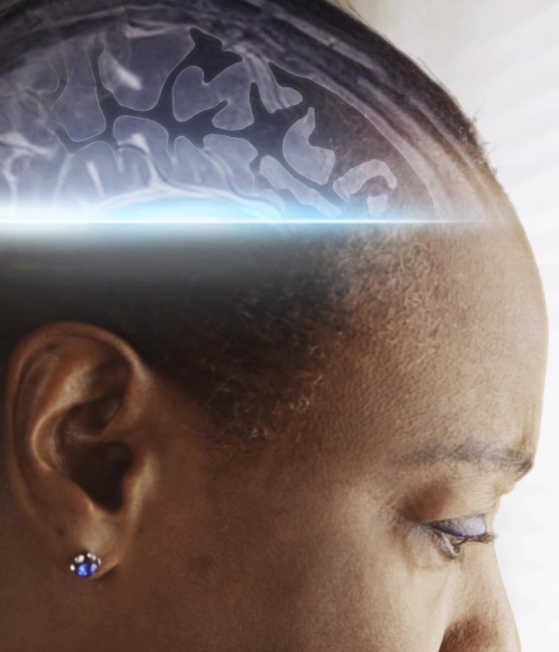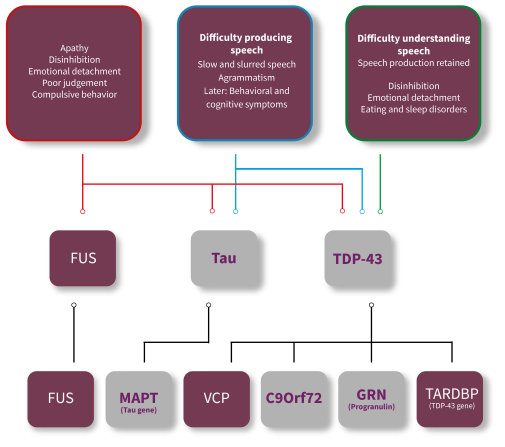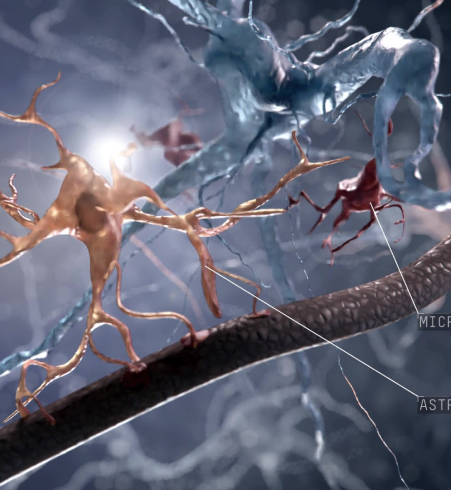NEURODEGENERATIVE DISORDERS
The exact disease ethology of most neurodegenerative disorders is still unknown, but the hallmarks of such is a build up of toxic proteins in the brain, leading to cell death of neurons or glia in certain regions of the brain associated with the specific disease. As many as one in five people over the age of 65 worldwide will have some form of neurodegenerative disorder by 2030.

Neurodegenerative disorders
Frontotemporal dementia (FTD)
GRN GENE MUTATIONS
This gene codes for a secreted growth factor-like protein called Progranulin (PGRN), which is produced by neurons and glial cells. GRN is a key regulator of microglia function in the brain with neuroprotective and antiinflamatory properties. Mutations in grn gene lead to a drop in Progranulin´s levels and have been associated with the development of FTD in 90% of the cases.
c9orf72 GENE MUTATIONS
Mutations in this gene have been associated with TDP-43 protein aggregation leading to FTD with behavioural disorders in the majority of cases (50-70%).

Currently there are no specific treatments for FTD, only medications that can reduce the impact of the FTD symptoms and improve quality of life.
OUR SOLUTION – NEURODEGENERATIVE DISORDERS – FTD
Engineered neural exosomes
loaded with nucleic acid vectors against proprietary targets
FTD is a severe and fatal disease of the brain characterized by massive loss of cortical neurons. A deficiency in the secreted growth factor Progranulin (PGRN) was found to be causative for a specific subtype of FTD, the behavioral variant FTD (bvFTD). In recent years, evidence increased for the involvement of GRN deficiency in other neurodegenerative diseases as Parkinson’s Disease and even Alzheimer’s Disease.
NOVEL RECEPTORS FOR PGRN
PGRN is a secreted protein, coded by GRN gene, with roles in tumorigenesis, inflammation, and neurobiology. Various functions have been proposed for PGRN in the periphery (e.g. inflammatory processes) but not much is known about the mechanisms or signal transduction pathways controlled by this protein, especially in the brain.
However, it is frequently associated with proliferation, migration, and survival underlining the connection of PGRN to cancer. A strong up regulation of PGRN expression can be seen in gliomas, the most malignant form of brain tumors. For a potential development of a FTD therapeutic it is of great importance to find a highly specific molecule that can operate as PGRN replacement without promoting its tumorigenic properties and supporting the development of cancer.
Read more
“Prediction is developing an exosome-based platform that is brain cell-type specific to deliver a therapeutic cargo to our disease-modifying targets.”
View detailed info


NEURODEGENERATIVE DISORDERS
Amyotrophic lateral sclerosis (ALS)
Amyotrophic lateral sclerosis is a progressive neurodegenerative disease that affects motor neurons both in the brain and the spinal cord. This damage in the motor neurons results in a progressive muscle weakness or wasting, that can finally cause general paralysis and difficulties for swallowing and breathing.
The age range of onset is 40-70 years. As it happens in FTD, protein aggregates of Tau, ADP-43 and SOD are the responsible for motor neurons damage in ALS.
The current treatment of this disease is focused on the management of symptoms to slow down the disease´s progression.
Our products
PRODUCTS
- RapidResponse c-FN 100%
- Thrombolytic Biosimilar 80%
- MNS-FTD2 47%
- MNS-FTD1 30%
Candidate
Discovery
Candidate
Optimization
Pre-clinical
Stage
Clinical stage
Market stage